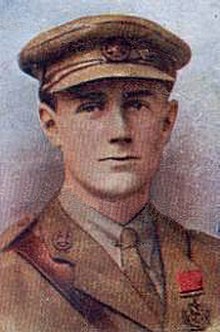Geoffrey Vickers: Difference between revisions
Sir (Charles) Geoffrey Vickers, VC (13 October 1894 – 16 March 1982) was an English lawyer, administrator, writer and pioneering systems scientist. He had varied interests with roles at different times with the London Passenger Transport Board, Law Society, Medical Research Council and Mental Health Research Fund. In the later years he wrote and lectured on social systems analysis and the complex patterns of social organisation. The Sir Geoffrey Vickers Memorial Award has been presented by the International Society for the Systems Sciences since 1987 in his memory.
He was awarded the Victoria Cross in World War I while serving in The Sherwood Foresters, and was knighted following World War II, during which he served as Deputy Director General at the Ministry of Economic Warfare, in charge of economic intelligence and as a member of the Joint Intelligence Committee.
Biography[edit]
Early life[edit]
Geoffrey Vickers was born and grew up in Nottingham, where his father Charles Henry Vickers ran a successful lace business, Vickers & Hine Ltd.[1] He described his first day of school as “school introduced me to the anguish reserved both for the non-conformist who wishes to conform and the awkward who long to excel in dexterity”.[2] He attended Bramcote, a preparatory school near Scarborough and then Oundle School; a public school before entering Merton College, Oxford where he briefly studied Classics from 1913 until the start of war.[3]
He later described his home as “a place of unalloyed happiness. The only stresses of the time came from the external world of school or the internal world of awakening conflict and confusion … I remember nothing desired that was satisfied by spending money of mine and nothing that was denied for lack of money … we moved by bicycle and bus, played in each other’s gardens and stayed in farmhouses”. He described his father as “the best and most lovable man I ever knew; and he seemed to combine the two superlatives without the slightest effort”.[2]
World War I[edit]


His education was interrupted by World War I. He and his brother William Burnell Vickers volunteered for service in the army. Geoffrey joined the Sherwood Foresters (7th Robin Hood Battalion) and was in France before the end of 1914[2] first as a second lieutenant, promoted to temporary captain in 1915 and then to major and as second in command, 1 Bn, The Lincolnshire Regiment in 1918. Explaining his thoughts about going to war, he later wrote
In August Germany invaded Belgium, we had a treaty with Belgium, so we all stopped what we were doing and went off to war. It was as simple as that.[2]
He was awarded the Victoria Cross (VC) for action in October 1915 and the Croix de Guerre (Belgium) in 1918.[3][5] The citation for his VC, appearing in The London Gazette in November 1915, reads as follows:
For most conspicuous bravery on 14th October, 1915, in the Hohenzollern redoubt. When nearly all his men had been killed or wounded, and with only two men available to hand him bombs, Captain Vickers held a barrier for some hours against heavy German bomb attacks from front and flank. Regardless of the fact that his own retreat would be cut off, he had ordered a second barrier to be built behind him in order to ensure the safety of the trench. Finally he was severely wounded, but not before his magnificent courage and determination had enabled the second barrier to be completed. A critical situation was thus saved.[6][7]
His brother Burnell was killed in action on 21 June 1917 while serving with the 184th Siege Battery of the Royal Garrison Artillery.[8]
In June 1918 he commanded a composite battalion in the Second Battle of the Marne for which he was awarded the Belgian Croix de Guerre.
Inter-war years[edit]
After the war he returned to Oxford and took a pass degree in French, European history and law in 1919.[3] He qualified as a solicitor in 1923 and by 1926 he was a partner in the leading London law firm of Slaughter and May. He specialised in the legal aspects of large financial operations, many of which had international dimensions. In 1930 he was one of the first to take the five-day Imperial Airways commercial flight from the UK to India[11] and during the 1930s he was also involved in negotiating the extension of the German debt.[12]
In 1938 he established and chaired the ‘Association for Service and Reconstruction.[12] The above initiative put him in touch with a number of people who met regularly in a group called ‘The Moot‘ that also included Joe Oldham, Karl Mannheim, Reinhard Niebuhr, Paul Tillich, John Middleton Murry, T. S. Eliot, Michael Polanyi, Sir Walter Moberly and Adolph Lowe. The Moot itself grew out of a conference on Church, Community and State held in Oxford in 1937.[13]
World War II[edit]
Vickers served in World War II; he was re-commissioned as a colonel, and was seconded as Deputy…

